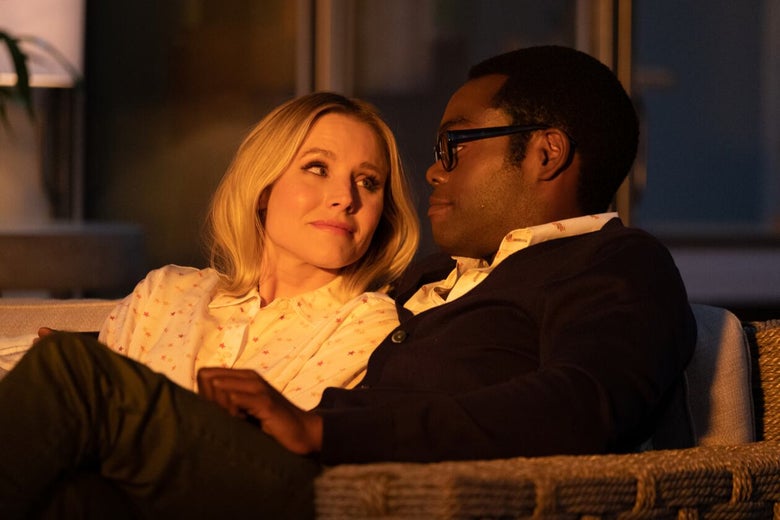
“Whenever You’re Ready” offered a fitting end to perhaps the last great network sitcom.
Colleen Hayes/NBC | 2019 NBCUniversal Media, LLC
If the world had ended between last week and this—destroyed, perhaps, by a swarm of giant flying shrimp—The Good Place would still have ended on a perfect note. The penultimate episode, “Patty,” left us where most finales would, with its central couple frozen in a moment of romantic bliss. But the show’s actual finale asked the question that happily-ever-after endings try to finesse: What happens next?
“Patty” found the series’ formerly damned souls finally arriving in actual heaven, and also introduced the idea that, given an infinity of time, even perfect happiness would become intolerably dull. That meant that the only true paradise was one from which you could eventually opt out: Life is made meaningful by death, and the afterlife by … whatever comes after that. It seemed inevitable that the finale would find the Soul Squad making the choice, one by one, to step through the door that would end their existence for good. Even its title, “Whenever You’re Ready,” coached us to brace for a series of teary farewells.
It made sense that Jason was the first to go: When your highest goals are racing go-karts with monkeys and playing a perfect game of Madden, it’s only a matter of time, even if that time is measured in Bearimys. Then it was Tahani, although she found another way out, trading the endless on-demand resources of the Good Place for the challenge of building new places. Their ends were fitting—especially when it turned out that even walking through a doorway was too complicated a task for Jason to handle—but it also felt like they were being moved aside to the show could get to the really important stuff.
The Good Place’s final season reminded us on numerous occasions that its core quartet had only persevered through their collective strength. As the reformed demon Michael once put it, when it comes to explaining how four morally compromised humans managed to rewrite the laws that govern all of existence, the reason is friends. But it was clear as far back as the end of the third season that the union of Eleanor and Chidi was the show’s endgame, and that its aspirations to take on the weighty issues of what it means to live a good life, especially in a world where even the smallest actions can have consequences thousands of miles away, would be constrained by the need to push them together and make it stick.
Chidi and Eleanor had eternities on end together, but when Chidi traded his philosophy texts for a copy of The Da Vinci Code, it was clear that his end, at least, was nigh. (And that was even before the familiar notes of Arvo Pärt’s “Spiegel im Spiegel” faded in.) They took a final tour of the sites where Chidi’s idols once lived, gazing at the Acropolis and passing by Les Deux Magots, but the man whose life was a torment of indecision had no doubts about his choice. William Jackson Harper’s final monologue, which filters Buddhist ideas about reincarnation through the “never let go” pledges of Titanic, was as pure and crystalline a moment of emotion as the show ever achieved. But it was Kristin Bell’s reaction that opened the floodgates, as Eleanor realizes that the only selfless, truly loving action is to let him go.
In an era when TV shows are judged on whether or not they stick the landing, there was something apt about the idea that the ultimate reward is the ability to leave before you get sick of the damn place.
Introducing a painless exit from the afterlife allowed The Good Place to punt on some of its biggest questions, like who created the universe (the highest-ranking figure we ever meet, the nearly-omnipotent Judge Gen, still feels like she’s enforcing someone else’s rules) and what happens after we die (the second time). The idea that going through the door would simply allow a person’s energy to rejoin the universe—as Eleanor took the fateful step, she dissolved into otherworldly fireflies that wafted down to Earth—felt more like New Age goop than moral philosophy, or maybe just a midway point between Immanuel Kant and Dan Brown. But in an era when TV shows are disproportionately judged on whether or not they stick the landing, there was something apt about the idea that the ultimate reward is the ability to leave before you get sick of the damn place.
With its endless reboots and play-acting demons, The Good Place was as much a show about TV shows as it was about the mysteries of the universe. One of its underlying questions was whether we can inch our way towards enlightenment by replaying the same scenarios over and over again, or whether real change involves ripping everything up and starting afresh. As a network sitcom—perhaps the last great one—the show was inherently incrementalist, bound to commercial breaks and setup-joke structures, although there were stretches of the last season when humor took a distant backseat to heart. But as virtually all of TV’s creative energy drifts in the direction of cable and streaming, the show’s dedication to working within those constraints—its insistence that you could make something meaningful and distinctive and still send it out over the airwaves for free—was in itself a small act of moral generosity. The Good Place went out on its own terms, with a finale that argued that choosing your own ending is both a reward you earn and a gift you give.
Readers like you make our work possible. Help us continue to provide the reporting, commentary and criticism you won’t find anywhere else.
Join Slate Plusfrom Slate Magazine https://ift.tt/2Oem7Tg
via IFTTT
沒有留言:
張貼留言